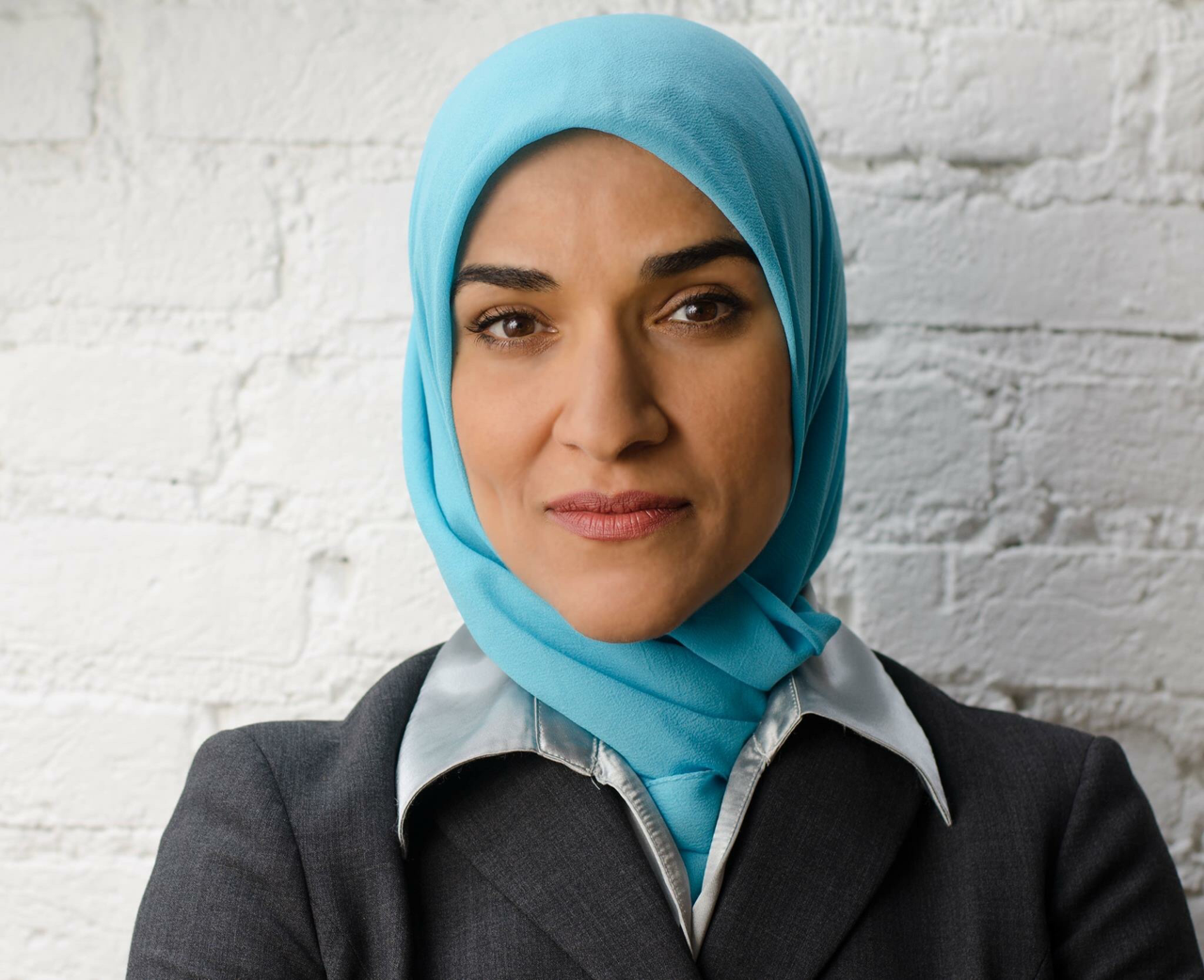Dalia Mogahed: Islamophobia in US politics and the Negative Impacts of Islamophobia on Democracy
Dalia Mogahed is the Director of Research at the Institute for Social Policy and Understanding, where she leads the organization’s pioneering research and thought leadership programs on American Muslims. Mogahed is former Executive Director of the Gallup Center for Muslim Studies, and co-author of the book Who Speaks for Islam? What a Billion Muslims Really Think. President Barack Obama appointed Mogahed to the President’s Advisory Council on Faith-Based and Neighborhood Partnerships in 2009. She is also the CEO of Mogahed Consulting.
Q1: In an article that you wrote, you argued that negative sentiments about Muslims and Islam in the United States follow domestic politics as opposed to international politics or acts of terrorism. Could you talk more about that?
I’d always believed that spikes of Islamophobia in the United States were related to terrorist attacks carried out by Muslims—most people believe that Islamophobia came about after 9/11—that bad Muslims do bad things and make all Muslims look bad as a result. That was always the diagnosis of the problem, and I believed that as well, but one time I noticed something strange. There was a weird spike in anti-Muslim sentiment around the connection between Islam and violence, and it was a spike during a time when there weren’t any new terrorist attacks, or recent escalations of violence in Iraq or elsewhere, and I wondered why do we have this spike? This is very weird, and hard to explain, and yet there it was. So, I looked into it more and realized that the spike was around the time of the 2008 presidential campaign.
In short, the spike happened when there were no new terrorist attacks, and it correlated with a campaign instead of a terrorist attack. I decided to conduct further research into this to see if there was a trend over a longer period of time looking within in a range of thirteen years, right before 9/11 all the way through 2013. What I found is that spikes in public opinion connecting Islam and violence spiked around the run-up to the Iraq war, and during the 2008 and the 2012 presidential campaigns. On the contrary, there were no spikes in public opinion connecting Islam and violence around the time of 9/11—there was actually a slight improvement in the public views of Muslims—and public opinion did not change at all following the Boston bombing. In fact, I even checked recently and public opinion did not change around the time of the San Bernardino or the Orlando shootings. What this indicates is that domestic terrorist attacks perpetrated by Muslims do less harm to public sentiment and the connection of violence and Islam, than do election cycles, and the manufacturing of consent in the run-up to war. That means that Islamophobia is a manufactured phenomenon, it is not an organic regrettable outcome of bad Muslims doing bad things, it is something that is being deliberately created in the public, and there’s research that proves that there is an entire industry dedicated to manufacturing fear. When you actually test this theory empirically, asking the questions, Where does Islamophobia come from? Why does it spike? It shows that it’s not the actions of bad Muslims, it’s the actions of politicians exploiting fear for votes, or for public consent to propel disastrous policies like the Iraq war.
Q2: Does this mean that politicians use Islamophobia to serve their political interests?
Absolutely. For politicians to gain support for initiatives abroad, and to gain votes, etc. We just witnessed the most extreme version of that during Trump’s presidential campaign, but it’s not the first time a Republican candidate used anti-Muslim sentiment to gain votes and popularity. This also happened with McCain, but even before McCain during the Republican primary, the word “Islamofacism” was a term that everyone was throwing around. You see the same thing during the 2012 Republican primary, where anti-Muslim rhetoric was the staple of the Republican primary sessions and debates.
Q3: When did anti-Muslim rhetoric start to appear as a platform in US political campaigns?
It started to appear at the fall of the Cold War, it was really in the 90s. One way to stop talking about communism was that the US government started talking about Muslims. In the early 1990s, following the destruction of the Berlin Wall, the dissolution of the Soviet Union, and the end of the Cold War, that was when the ‘new enemy’ emerged. In the first Gulf War anti-Muslim sentiment was necessary to manufacture consent, same thing with the second Gulf War, which helped cement negative public sentiment toward Muslims. Islamophobia did not occur because of 9/11, I know that’s the narrative, and that everything was perfect and wonderful prior to the attacks, but in reality it wasn’t, Islamophobia existed in the United States well before 9/11. The events of 9/11 provided lots of extra power and influence to inflate Islamophobia in the US, but up until the 9/11 attacks, the Oklahoma City bombing was considered the biggest terrorist attack on US soil, having been carried out of course by Timothy McVeigh. The interesting thing about the Oklahoma City bombing—which occurred during President Clinton’s administration—is that Muslims were blamed right away for the bombing. Muslims were specifically targeted and as a result there were mosques that were burned down, and people were actually killed in hate crimes. So, this all happened and it wasn’t 9/11. Soon after, there was a secret evidence law that was passed in response to the Oklahoma City bombing, a crime that wasn’t perpetrated by a Muslim, yet, the secret evidence policy was used almost exclusively against Muslims. Interestingly, and very ironically, the reason that Muslims in 2000—many of them, not all of them—voted for Bush was because he promised to repeal secret evidence. Secret evidence is basically when the government will present evidence that you can’t refute, you can’t argue against, you can’t see it, and your lawyer can’t see it, because it’s considered a matter of national security. What was happening was people were being tried using evidence that they had no access to, and no way of explaining, or refuting, and people weren’t getting fair trials—it was actually during the Clinton administration that secret evidence was put in place, and it was used almost entirely against Muslims—so Bush said he would repeal secret evidence, but instead he introduced the Patriot Act in the aftermath of 9/11.
Q4: You briefly spoke to this already, but how did Islamophobia exist prior to 2001?
Islamophobia existed in the United States prior to 2001, but it didn’t have a name, people didn’t talk about it, and I’m glad we recognize that it exists now and we can’t deny it. There were literally Islamophobia deniers, and yet Islamophobia was everywhere, and people didn’t recognize it, we didn’t study it, and researchers weren’t writing about it, but of course it was there. If you look at movie images, to the way Muslim women are portrayed, as well as many other examples, you can see that Islamophobia has been something that you can actually track, and with the fall of the Soviet Union, there was a transfer of fear from the communist to the Muslim terrorist.
Q5: How does Islamophobia affect democracy?
Islamophobia affects democracy in at least three ways. First, the anti-Sharia legislation The anti-Sharia legislation is really part of a larger problem, as the same lawmakers that are targeting Muslims are targeting other minorities a well, and what the legislation does is it restricts people’s rights, and fosters a political climate that makes it easier to restrict those rights. With that, the rights of Muslim Americans are then restricted and the rights of other minorities are also restricted, and Islamophobia creates the political climate to make that possible, thus affecting democracy. Secondly, Islamophobia hurts our democracy in that it scares people, as Islamophobia is fueled by fear. Fear makes people more accepting of authoritarianism, conformity, and prejudice, and those three things undermine democratic principles, and it makes people less likely to dissent, to speak out, and to hold their government accountable. And thirdly, it manipulates people, and manipulates the public to consent to policies that they would otherwise not agree to. Without the influence of Islamophobia and the increase of fear that was documented in run-up to the Iraq war, would the American people have consented to it? Would the majority of Americans have agreed that the US should go to war? Interestingly, polls show that the day before the invasion, the majority of Americans believed that there was a direct connection between 9/11 and Iraq, leading to public consent by false information. The public’s fear was fueled to an irrational extent that they were agreeing to things and believing in things that weren’t true, and then a few years later the vast majority of Americans believe that the Iraq war was a mistake. Islamophobia hurts democracy because it manipulates the public, and the fundamental condition of democracy is an informed, rational citizenry, and when you have a citizenry that is manipulated, lied to, and irrationally afraid, then you no longer have a democracy.
Q6: How can we challenge Islamophobia?
We can challenge Islamophobia like how we challenge any other form of bigotry or racism; we first have to learn what it is, and we have to educate ourselves on its fundamental manifestation. Islamophobia is not just rhetoric, like someone saying, ‘lets ban Muslims,’ just as anti-black racism isn’t simply a confederate flag, or burning a cross in the front yard of a black church. There are many subtle and insidious ways that racism and bigotry manifest, so when we educate ourselves on what those are, and how we can ourselves conform to them and have these implicit biases, we develop an awareness and ability to conquer those things. Bias is everywhere, we all have it, and most people just don’t realize it because it’s implicit, but the more we become aware of it, the more we can do to eliminate it. That’s one of the ways to challenge Islamophobia, is to become aware and educated on what it is, and what it looks like, and challenge it. Then there’s organizing; the media is incredibly bias, and one study showed that 80 – 90% of the coverage of Islam and Muslims in TV news media in the United States is negative. We can organize to put pressure on our media outlets to be fair by contacting their sponsors and by talking to their editorial boards. Call Islamophobia out every time you see it in the media because if the public truly decides that this is not how they want to be informed, then it will have to change. The final thing that we have to recognize is that Islamophobia is not just individuals, it’s institutional, and they feed off of each other. Institutional Islamophobia is the overuse of informants, surveillance, and racial profiling of Muslims that feeds the idea to the public that Muslims are to be suspected, to be feared, and to be looked down upon. This same public sentiment makes it possible for the government to target Muslims through institutionalized Islamophobia, so they are mutually reinforcing, and this means that we have to challenge the policies, not just the individual prejudice—which is bad—but the real harm comes from when the government institutionalizes this kind of prejudice.
**Interview edited for clarity


